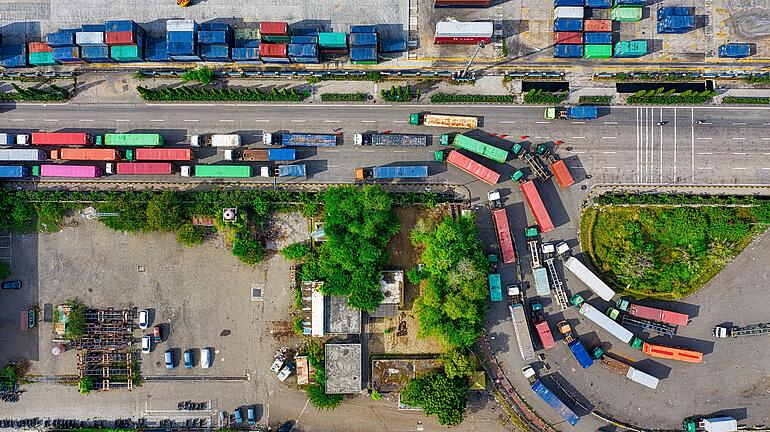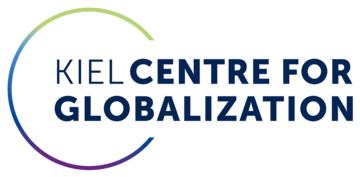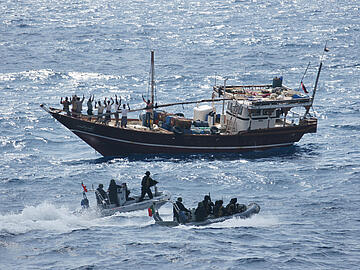Kiel Institute Highlights
Global value chains scrutinized from various sides
In 2021, the Kiel Centre for Globalization (KCG) examined aspects of sustainability, security, and innovation in global value chains, among other things. An overview of selected research findings.

Trade and sustainability
Hanley and Semrau (forthcoming) investigated the ability of exports to trigger the adoption of environmental innovation (EI) in firms, shedding light on the determinants of convergence in environmental standards for Europe’s catch-up economies. They found that particularly Eastern European exporters report higher EI adoption propensities, an effect exclusively driven by process-based EI and not observable for product-based EI. Additionally, they revealed that regardless of a firm’s origin, exposure to importing countries with high market-related environmental policy stringency, is linked to the adoption of EI. They concluded that learning-by-exporting, regulation-push and demand-pull mechanisms may help to explain these findings, with foreign markets being characterized by a wider diversity of stakeholder preferences

Trade and innovation
Gong and Hanley (2021) explored the extent to which new products are triggered by exports (direct effects) and by exposure to other exporters (indirect effects), to better understand China’s meteoric economic transformation. Their analysis revealed an overwhelmingly positive direct effect of exports on new product introductions and a more modest spillover effect. Interestingly, firms with a reduced need to innovate (processing exporters) can also appropriate export spillovers. The findings have implications for other developing countries seeking to maximize exporting in economic clusters, promoting innovation, and ultimately growth.
Trade and corporate social responsibility (CSR)
Herkenhoff et al. (2021) studied the incentives for and investments in CSR at different stages of the production process. Based on data for India, they found that the closer firms are to final consumers, the more strongly they are engaged in CSR activities in terms of expenditure in staff welfare and social community. Görg et al. (2021) discussed costs and benefits of having an act on corporate due diligence in supply chains for the case of Germany. They argued while more detailed monitoring of international supply chains may lead to higher costs for companies in the short term, cost reductions and efficiency gains in production canbe expected in the medium to long term. This will increase the competitiveness of German companies in international markets where attention is paid to sustainable production.

Trade and security
Sandkamp et al. (forthcoming) analyzed the impact of maritime piracy on trade and transport at product-, firm-, and ship-level. They found that maritime piracy does have a small but significant dampening impact on trade. Overall exports along shipping routes affected by maritime piracy fall following an increase in pirate activity. In addition, piracy induces firms to switch from ocean to air shipping, while remaining ocean shipments become larger. At the ship-level, the paper provides evidence for re-routing, as container ships avoid regions prone to pirate attacks.
Foreign direct investment (FDI)
Berger and Liu (2021) examined whether the contents of international investment agreements (IIAs) have gradually converged to facilitate the multilateralization of investment rules, thus easing cross-border investment flows. They found that IIAs negotiated among non-G20 countries are more similar to each other than those concluded by G20 countries. Since 2000, this pattern has been even more pronounced. This result calls into question the premise that the G20 can serve as the most suitable forum to initiate multilateral negotiations on multilateral investment rules. Kannen et al. (2021) investigated whether firms with foreign ownership are more likely to adopt ‘green’ management practices, which determine the capability to monitor and improve a firm’s impact on the environment. By using multi-country firm-level data for analysis, they found that foreign ownership increases the likelihood of implementing green management practices, thus contributing to a country’s green economic transformation. They also showed that country and firm heterogeneity exists regarding the foreign ownership impact on green practice implementation.
Dialogue with science, politics and the public
Despite the COVID-19 pandemic, KCG organized several digital research seminars to share its research findings with academics, policymakers, and the interested public. In addition, it organized jointly with UNIDO and the Research Network Sustainable Global Supply Chains the 2021 Forum on Globalization and Industrialization (FGI 2021).
Engagement with the general public through various national and international media outlets also continued in 2021, covering a wide spectrum of topics centered on globalization such as decoupling, trade and sustainability, corporate social responsibility and due diligence law, global supply shortages and the EU-China investment agreement.
References:
Berger, A., und W.-H. Liu (2021). Can the G20 Serve as a Launchpad for a Multilateral Investment Agreement? The World Economy 44 (8): 2284–2302.
Gong, Y., und A. Hanley (2021). Exports and New Products in China – A Generalized Propensity Score Approach with Firm-to-Firm Spillovers. The Journal of Development Studies 57 (12): 2136–2155.
Görg, H., et al. (2021). Ein Lieferkettengesetz für Deutschland? KCG Policy Paper 7. IfW Kiel.
Hanley, A. und F. O. Semrau. Stepping up to the Mark? Firms’ Export Activity and Environmental Innovation in 14 European Countries. Industry and Innovation. Im Erscheinen.
Herkenhoff , P., et al. (2021). Corporate Social Responsibility Along the Global Value Chain. CESifo Working Paper 9498, CESifo.
Kannen, P., F. O. Semrau, und F. Steglich (2021). Green Gifts From Abroad? FDI and Firms‘ Green Management. Kieler Arbeitspapiere 2200. IfW Kiel.
Sandkamp, A., V. Stamer und S. Yang. Where has the Rum Gone? The Impact of Maritime Piracy on Trade and Transport. Review of World Economics. Im Erscheinen.